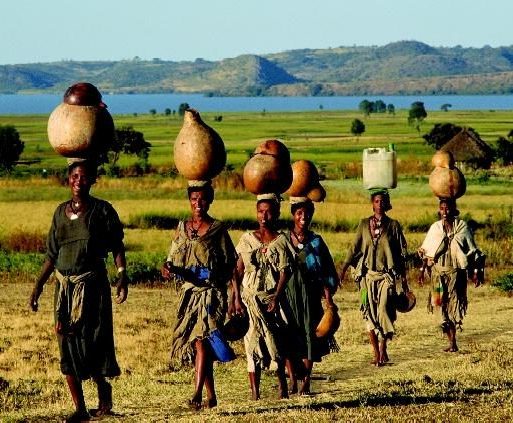
Water is the most essential ingredient to life. In the developed industrial world, water is taken for granted; it flows unrestricted into homes and is always clean and sanitary. However, this is not the case for many in the developing and peripheral parts of the globe where women and children spend countless hours hauling water fouled by pollution and disease. Limited or absent access to clean water and sanitation facilities have measureable impacts on quality of life and mortality. Global warming is projected to decrease access to potable water in many regions of the world and thus water is one of the most exigent issues today.
Drudgery and Disease Compounded
The United Nations Development Programme reports that nearly 1 billion people worldwide lack access to clean water and a staggering average of 5,000 children die each day because of water borne disease. The primary burden of collecting water falls squarely on the shoulders of women and children. The Inter Press Service reported in 2012 that women in Sub-Saharan Africa spend an average of 40 billion hours per year collecting water, a statistic representative of other developing regions. Finally, the World Health Organization and UNICEF clean water-monitoring program estimates that 672 million people will still lack access to improved drinking-water sources in 2015. Reality is that women in two-thirds of the world are able to do little more than ensure basic survival for their families, leaving no room or time for education, gainful occupation or even a small move out of poverty.
A Global Responsibility
What is at issue here is a global responsibility to ensure that all people have access to sustainable and hygienic sources of water. Study after study has found that access to sanitation facilities and clean water is one of the most successful routes out of poverty, particularly for women. In a study of the relationships between gender, service provision and poverty conducted in 88 communities in 15 countries, the Water and Sanitation Program found that when women were included in the community management of water supply sources, increased gender equity and higher resource sustainability are the positive outcomes.
The Benefits of Clean Water Access
Women with ready access to clean water were able to use the hours they gain for education, work and family care, substantially improving their family’s quality of life and future prospects. The simple provision of a faucet could thus radically transform the lives of women in the developing world and lead to the eventual alleviation of disease and gain of autonomy and self-sufficiency for approximately two-thirds of the world’s population. Improved circumstances for women translate into smaller families, healthier children, increased family prosperity and potentially broader participation in other aspects of the social world including policymaking and economic sustainability. Ignoring the struggles of people in the developing world and complacency in the face of such staggering disparities is ethically impoverished. The International Panel on Climate Change reports that climate change due to global warming will increase water scarcity in many regions, including some of the industrial and post-industrial world. Thus, these struggles could potentially be extended to more women in the world, decreasing quality of life and increasing mortality from preventable diseases among families across the globe. Companies, such as Kinetico, know the importance of clean water and encourage people to act is now as the window of opportunity is closing.
American Water is an authorized Kinetico dealer based out of Round Rock, Texas. They specialize in water purification systems, such as water softeners and water filters. For more information, connect with them on Facebook.
Support InfoStride News' Credible Journalism: Only credible journalism can guarantee a fair, accountable and transparent society, including democracy and government. It involves a lot of efforts and money. We need your support. Click here to Donate